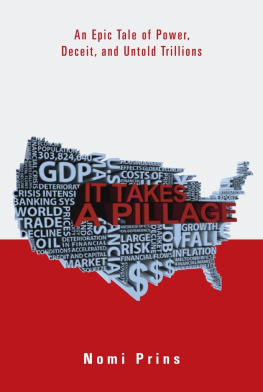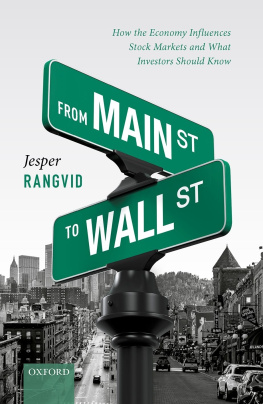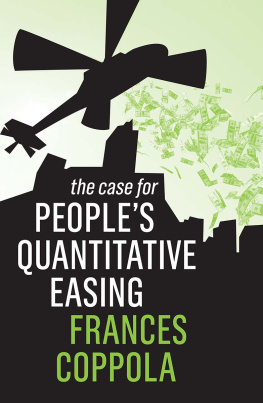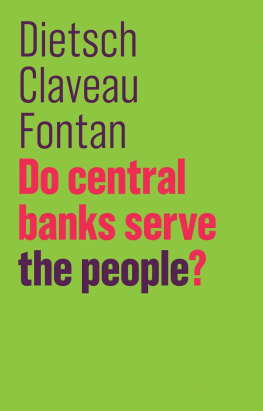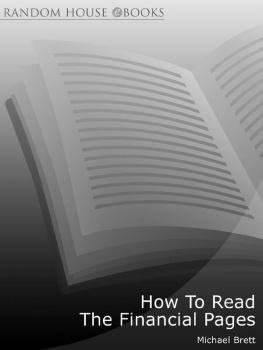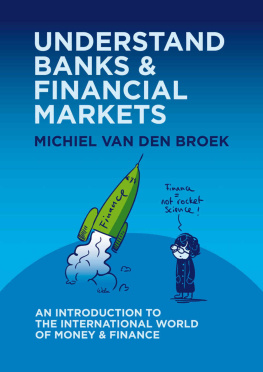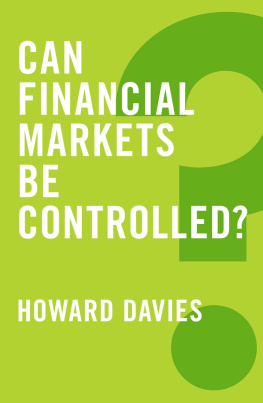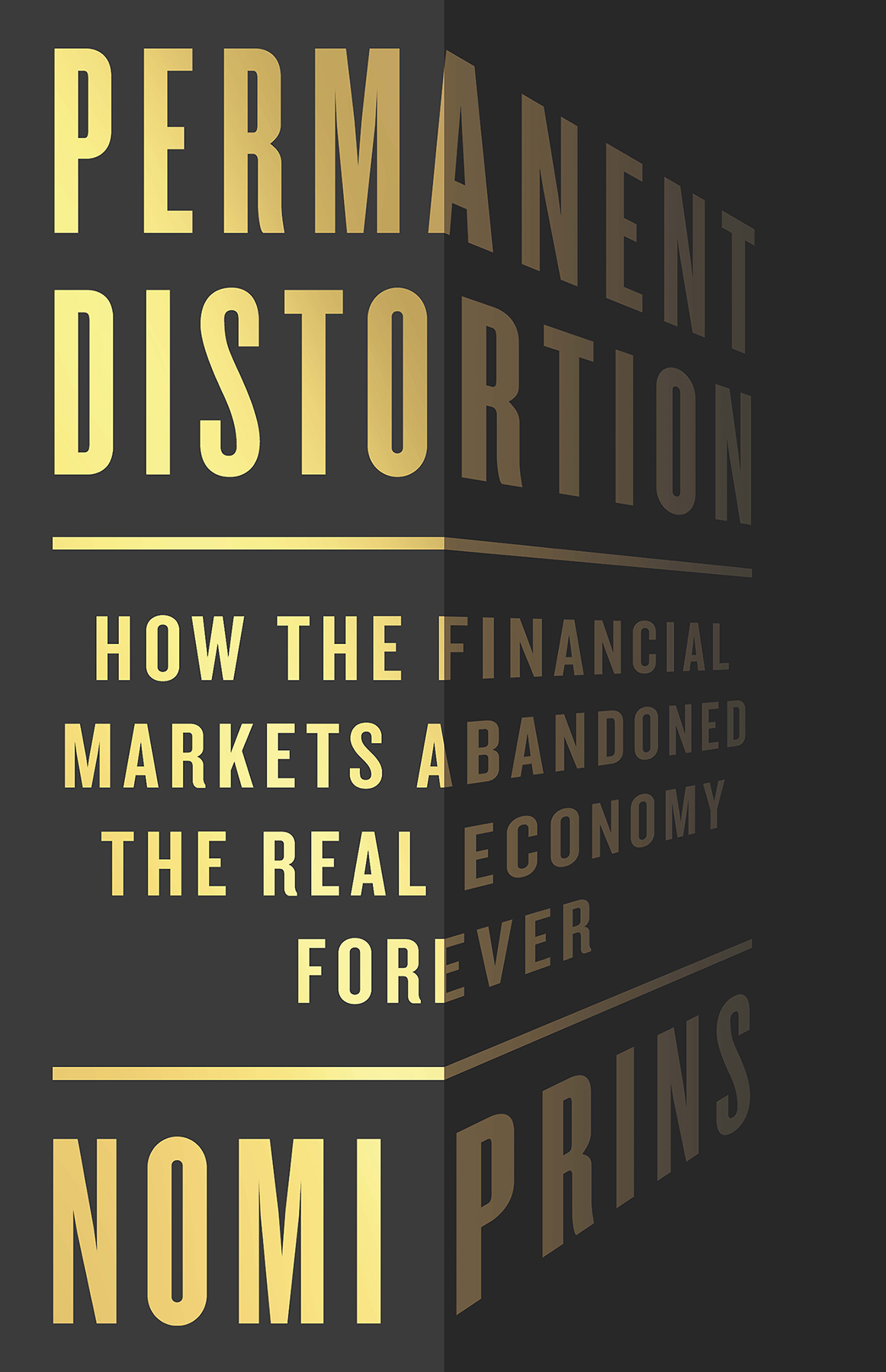Nomi Prins, former Goldman Sachs big shot, has come out of the cold to let you in on the conand the clear and present danger that the Magic Money junkies and their central-bank pushermen are pulling us into a strange counter-reality where fantastical finance creatures copulate with finance fairy dust, creating a cancerous economic monstrosity. Yet, its weirdly fun to fly through the crazed new world Prins reveals. Every chapter is a new freaky adventure. She even makes the words Quantitative Easing and crypto blockchain ETFs into a fascinating game show where They win and you, Mr. and Ms. go-to-work schmuck, lose. Jump in, I guarantee you a helluva ride.
Collusion
All the Presidents Bankers
Black Tuesday
It Takes a Pillage
Jacked
Other Peoples Money
Copyright 2022 by Nomi Prins
Cover design by Pete Garceau
Cover copyright 2022 by Hachette Book Group, Inc.
Hachette Book Group supports the right to free expression and the value of copyright. The purpose of copyright is to encourage writers and artists to produce the creative works that enrich our culture.
The scanning, uploading, and distribution of this book without permission is a theft of the authors intellectual property. If you would like permission to use material from the book (other than for review purposes), please contact permissions@hbgusa.com. Thank you for your support of the authors rights.
PublicAffairs
Hachette Book Group
1290 Avenue of the Americas, New York, NY 10104
www.publicaffairsbooks.com
@Public_Affairs
First Edition: October 2022
Published by PublicAffairs, an imprint of Perseus Books, LLC, a subsidiary of Hachette Book Group, Inc. The PublicAffairs name and logo is a trademark of the Hachette Book Group.
The Hachette Speakers Bureau provides a wide range of authors for speaking events. To find out more, go to www.hachettespeakersbureau.com or call (866) 376-6591.
The publisher is not responsible for websites (or their content) that are not owned by the publisher.
Library of Congress Cataloging-in-Publication Data
Names: Prins, Nomi, author.
Title: Permanent distortion : how the financial markets abandoned the real economy forever / Nomi Prins.
Description: First edition. | New York : PublicAffairs, 2022. | Includes bibliographical references and index.
Identifiers: LCCN 2022013120 | ISBN 9781541789067 (hardcover) | ISBN 9781541789074 (ebook)
Subjects: LCSH: Financial crises. | Free enterprise. | Economic history.
Classification: LCC HB3722 .P75 2022 | DDC 338.5/42dc23/eng/20220323
LC record available at https://lccn.loc.gov/2022013120
ISBNs: 9781541789067 (hardcover), 9781541789074 (ebook)
E3-20220830-JV-NF-ORI
To my dad
It takes all the running you can do, to keep in the same place.
If you want to get somewhere else, you must run at least twice as fast as that!
THE RED QUEEN , in Lewis Carrolls Through the Looking-Glass
What is really amazing, and frustrating, is mankinds habit of refusing to see the obvious and inevitable until it is there, and then muttering about unforeseen catastrophes.
ISAAC ASIMOV
If youve ever wondered why the stock market seems to always go up but your own financial situation doesnt behave in the same way, youre not aloneand youre not crazy. There are forces at work that fuel financial markets at the expense of destabilizing the real economy. In the world that most of us inhabit, people are struggling to pay rising bills and working grueling hours to make ends meet. Theres a divide between those hard-pressed to cover basic needs and the giddiness of the financial markets, where billionaires thrive; the two groups might as well be living in alternate universes. The economy and high finance do coexist, but they dont have much to do with each other when you dig beneath the surface. Money is the obvious divider.
The reality is that money, like a virus, will always seek the easiest way to reproduce itself. The profits represented by stocks and bonds have disproportionately accrued to the wealthy and investor class relative to everyone else. That shift has left the world fragmented across multiple economic, political, and societal levels where instability is rampant and
Permanent Distortion is the story of the winners and the losers of todays financial and monetary system. But the wedge between those who have and those who dont isnt just about inequality. While that is certainly a by-product of permanent distortion, the story runs deeper.
There have been two major financial crises since the dawn of the twenty-first century: the Great Recession of 2008 and the pandemic of 2020. But there has been only one response from the most powerful governments, institutions, central banks, and political leaders. Their collective reactions have fostered a desolate landscape of frenetic economic consequences. What that produced is a wave of intensified and widespread social unrest, disjointed political upheaval, dangerous extremism, punishing trade wars, and sweeping isolationism.
Our economic dystopia isnt simply the result of responses to a once-in-a-century pandemic. Something more is at work. Through either carelessness, greed, incompetence, nepotism, or sheer corruption, leaders now decide how and where money flows during periods of calm and in times of crisis. The rift between the jubilance of the financial markets and the despondency of economies means that markets and their demands, not people and their needs, are reshaping the world.
Todays financial system is as unhinged from the realities of classic capitalism as it is from the economy. Central banks have become money dealers and inequality enablers. When faced with crisis, they zoomed past being lenders of last resort to being arbiters of who wins and loses in the economy. They are now money-creating machines that are fostering riskier and bigger bubbles than ever before. Their policies are setting up future crises and systemic economic fractures. Institutions may be too big to fail, but the overall market has now become too big to be left alone.
This new era has its roots in the financial crisis of 2008. That was when markets addiction to cheap money, driven by the low (zero to negative) interest rates that major central banks offered big banks, took flight. Central bankers characterized their experimental policy decision to unleash trillions of dollars of new money combined with the purchase of trillions of dollars of debt from the biggest banks as an emergency reaction. What started as an artificial jolt to Wall Street to juice up the demand for securities ended up triggering the longest bull run in history. The reality of that move is that no policy decision comes without consequences.
After nearly a decade and a half, that policy and its ramifications unfolded in four key parts. First, there was the chaos of the financial crisis that established what was dubbed an emergency response. Then came the market addiction to central bank money. That was followed by a policy reaction that took central banks into overdrive facing the next chaos. Finally, weve reached a metamorphosisnot just of monetary policy, but into a broad, fresh reality.
As central bank aid turbocharged banks and markets, it acted as a launchpad for record amounts of public and private debt to be issued. These conditions triggered a wave of wealth accumulation without accountability. While central banks could flood the markets with cash, they could not control how it was spent. They could intervene with financial alchemy but had no authority to enforce whether extra debt could ever be repaid through economic growth. The very existence of this debt became a convenient excuse for governments the world over to cut budgets and reduce public spending in areas such as medical care, education, retooling for workers, and infrastructure. Companies that took on massive debt turned to cutting jobs, increasing hours, and reducing benefits to compensate for it. As shareholders reaped the benefits of central bank interventions, workers were being left behind and squeezed out.


